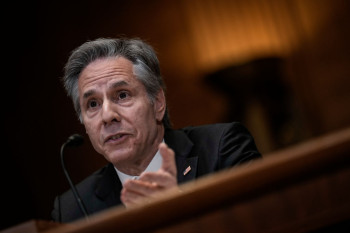The Hague-based International Criminal Court (ICC) responded on March 23 to threats made by Russia, expressing regret over the country's attempts to obstruct "international efforts to ensure accountability" for violations of international law.
"The Presidency of the Assembly emphasizes that the Court, its elected officials, and its staff have the strong support of the Assembly of State Parties to the Rome Statute," the statement read.
"We reaffirm its full confidence in the Court as an independent and impartial judicial institution and reiterate our strong commitment to uphold and defend the principles and values enshrined in the Rome Statute and to preserve its integrity undeterred by any threats," the statement added.
The ICC issued arrest warrants on March 17 for Russian dictator Vladimir Putin and Maria Lvova-Belova, the Russian official overseeing the forced deportations of over 16,000 Ukrainian children to Russia.
In its statement, the ICC wrote that it believes Putin “bears individual criminal responsibility” as the leader of Russia for the crimes committed against Ukrainian children.
Russian ex-President Dmitriy Medvedev went on to threaten a missile strike against the Hague on March 20.
"Everyone walks under God and missiles. It's quite possible to envision a scenario where a Russian ship stationed in the North Sea could strategically strike the Hague courthouse with a hypersonic Onyx (cruise) missile," Medvedev, who is currently the deputy chairman of Russia's Security Council, wrote.
He went on to warn judges of the International Criminal Court to "look carefully at the sky."
Russian investigators also announced on March 20 that they had opened a case against members of the ICC for issuing the arrest warrants.
Namely, the Investigative Committee of Russia targeted ICC prosecutor Karim Khan, as well as judges Tomoko Akane, Rosario Salvatore Aitala, and Sergio Gerardo Ugalde Godinez.
According to a press release, the committee is accusing the ICC of "bringing a known innocent person to criminal responsibility" and preparing "an attack on a representative of a foreign state who enjoys international protection, with the aim of complicating international relations."
Russia withdrew from the ICC in 2016 after the international organization criticized its illegal annexation of Ukraine's Crimean peninsula, meaning that Putin cannot be arrested unless he sets foot in one of the 123 countries that are party to the court.











